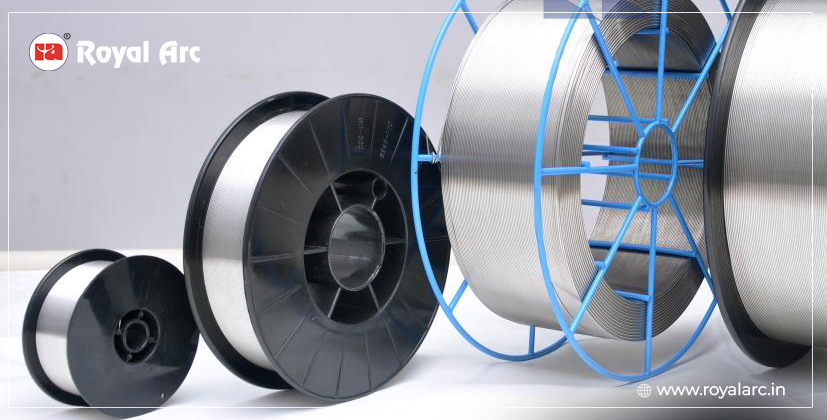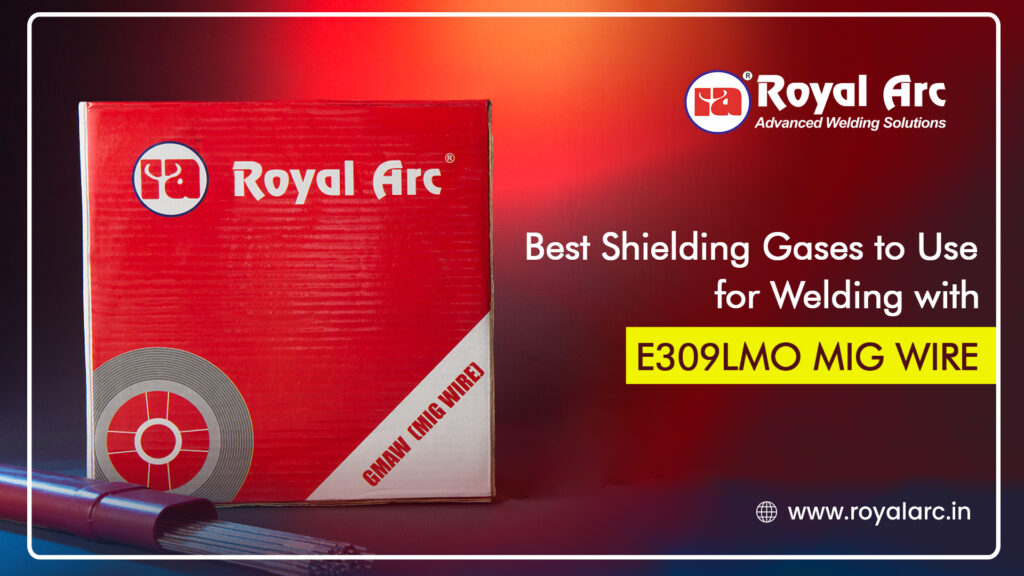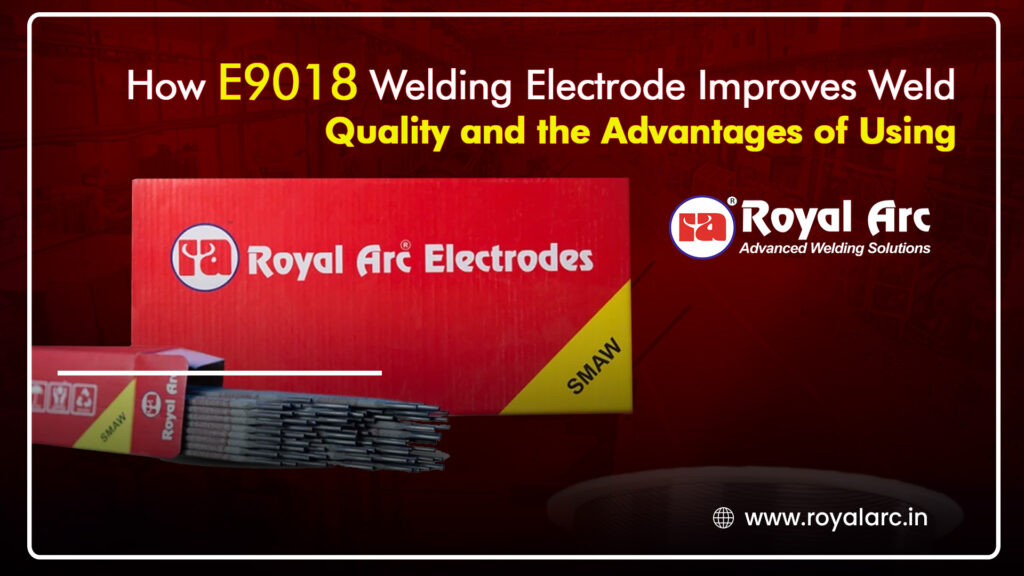As a renowned manufacturer and supplier of welding consumables in India, Royal Arc is proud to offer a comprehensive range of high-quality MIG welding wires. Our expertise in this field is unmatched, and we are committed to meeting the diverse needs of our customers. MIG (Metal Inert Gas) welding, also known as gas metal arc welding (GMAW), is a popular and versatile welding process used across a wide range of industries, from manufacturing and construction to automotive and shipbuilding.
The type of MIG welding wire you choose can significantly impact the quality, strength, and overall performance of your welds. In this blog post, we will explore the wide variety of MIG welding wires available, each with its unique features and applications, giving you a broad range of options to choose from.
Solid MIG Welding Wire
Solid MIG welding wires are the most commonly used type of MIG wire. They are made from a single, solid metal alloy and are available in a variety of materials, including mild steel, stainless steel, and aluminum. Solid MIG wires are known for their excellent weldability, superior mechanical properties, and ease of use.
Mild Steel MIG Welding Wire
Mild steel MIG welding wire is the most widely used type of solid MIG wire. It is an affordable and versatile option suitable for a wide range of applications, including general fabrication, structural welding, and automotive repair. Mild steel MIG wire is known for its excellent penetration, good bead appearance, and high tensile strength.
Stainless Steel MIG Welding Wire
Stainless steel MIG welding wire is a popular choice for welding stainless steel components, such as those found in food processing equipment, chemical plants, and marine applications. It is known for its corrosion resistance, high strength, and attractive appearance. Stainless steel MIG wire is available in a variety of grades, each with its own unique properties and applications. For example, 304 stainless steel wire is commonly used for general-purpose welding, while 316 stainless steel wire is preferred for applications requiring high corrosion resistance.
Aluminum MIG Welding Wire
Aluminum MIG welding wire is a popular choice for welding aluminium alloys, which are commonly used in the automotive, aerospace, and marine industries. Aluminum MIG wire is known for its excellent electrical and thermal conductivity and its lightweight and corrosion-resistant properties. However, welding aluminium can be more challenging than welding steel and requires careful attention to preheating, shielding gas, and welding parameters. To ensure successful welds, it’s recommended to preheat the aluminum to reduce the risk of cracking, use a high-purity argon shielding gas, and adjust the welding parameters to match the specific alloy being welded.
Flux-Cored MIG Welding Wire
Flux-cored MIG welding wire is a type of consumable that combines a solid metal core with a flux-filled sheath. This type of wire is designed to provide the benefits of both solid wire and stick electrode welding, including improved weldability, deeper penetration, and better slag removal.
Self-Shielding Flux-Cored Wire
Self-shielding flux-cored MIG welding wire is a type of flux-cored wire that does not require an external shielding gas. Instead, the flux core within the wire generates its own shielding gas as it is melted, making it a convenient and versatile option for welding in outdoor or windy conditions or areas with limited access to shielding gas.
Gas-Shielded Flux-Cored Wire
Gas-shielded flux-cored MIG welding wire is a type of flux-cored wire that requires an external shielding gas, such as argon, carbon dioxide, or a mixture of the two. This type of wire is often used for welding thicker materials or achieving deeper penetration and is particularly well-suited for applications where appearance and weld quality are important, such as in the automotive and shipbuilding industries.
Choosing the Right MIG Welding Wire
When selecting the right MIG welding wire for your application, several factors must be considered, including the base material, the welding position, the desired weld characteristics, and the welding equipment being used.
Base Material
The base material being welded will largely determine the type of MIG welding wire you should use. Mild steel, stainless steel, and aluminium each require different types of wire with unique properties and characteristics.
Welding Position
The welding position, such as flat, horizontal, vertical, or overhead, can also influence the choice of MIG welding wire. For instance, vertical welding may require a wire with higher fluidity to prevent the weld from sagging, while overhead welding may require a wire with better slag control to prevent slag from falling into the weld. Some wires are better suited for certain welding positions than others and may provide improved bead appearance, penetration, or overall weld quality.
Weld Characteristics
The desired weld characteristics, such as strength, flexibility, corrosion resistance, or aesthetic appearance, can also guide the selection of the appropriate MIG welding wire. For example, if you’re welding a structure that needs to withstand heavy loads, you may need a wire with high tensile strength. If you’re welding a component that will be exposed to corrosive environments, you may need a wire with high corrosion resistance. Different wire compositions and shielding gas mixtures can be used to achieve specific weld characteristics.
Welding Equipment
The type of welding equipment used, including the power source, wire feeder, and gun, can also impact the choice of MIG welding wire. Some wires may perform better with specific equipment configurations, while others may be better suited for specific welding applications.
At Royal Arc, we understand the importance of selecting the right MIG welding wire for the job at hand. That’s why we offer a comprehensive range of high-quality MIG welding wires, including solid and flux-cored options, to meet the diverse needs of our customers.
Our solid MIG welding wires, available in mild steel, stainless steel, and aluminium, are known for their excellent weldability, superior mechanical properties, and consistent performance. Our flux-cored MIG welding wires, both self-shielding and gas-shielded, offer improved weldability, deeper penetration, and better slag removal, making them a popular choice for a wide range of applications.
At Royal Arc, we are committed to providing our customers with the highest-quality welding consumables and the technical support they need to succeed. Our team of skilled engineers and technicians is always available to help you select the right MIG welding wire for your specific needs and provide guidance on best practices for optimal welding performance. Whether you need assistance with choosing the right wire, adjusting your welding parameters, or troubleshooting welding issues, we’re here to help.
Whether you’re working on a small repair project or a large-scale manufacturing operation, Royal Arc has the MIG welding wire solutions you need to get the job done right. Contact us today to learn more about our products and services and discover how we can help you take your welding capabilities to the next level. We look forward to hearing from you!




